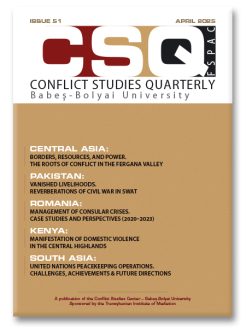
Issue 51 – April 2025
TOPICS: Fergana Valley, civil war, consular crisis, domestic violence, UN peacekeeping operations
Coordinator:
Christian Chereji and Ciprian Sandu
Content – Sommaire:

ARTICLES in Issue 51 – April 2025:
Central Asia: Borders, Resources, and Power. The Roots of Conflict in the Fergana Valley
Medihanur ARGALI
Abstract:
The Fergana Valley, as a strategic and multiethnic region of Central Asia, has long been a center of conflict. This study analyzes the ethnic conflicts in the Fergana Valley by focusing on historical, economic, and political causes. This study examines the impact of inequalities in resource sharing, artificial borders, and regional power struggles on ethnic tensions. Empirical analysis of the conflicts in the valley reveals that competition over natural resources, border disputes, and political manipulation by local leaders have played a key role in exacerbating tensions. This study emphasizes that fair resource management and regional cooperation are crucial for achieving sustainable peace.
Keywords:
Fergana Valley, ethnic conflict, resource sharing, Central Asia, border disputes.
DOI: https://doi.org/10.24193/csq.51.1

Pakistan: Vanished Livelihoods. Reverberations of Civil War in Swat
Haseeb BHATTI & Steven LIM
Abstract:
This case study relies on primary data from a household survey conducted in conflict affected Swat. The methodology consists of a two-step procedure. First, the k-means clustering tool validates the household classification in Swat. Second, we identify asset base (human, physical, social, natural, and financial) constraints in pursuing alternative high-return and sustainable livelihood possibilities. The specific limitations in human and financial capital are observed. We highlight priority improvements in wide-ranging infrastructural necessities. These have strong potential to make household livelihood choices sustainable again. Such sustainability is likely to diminish their chances of sympathizing with and joining militants again. If not, they may fall under their strong influence again.
Keywords:
Post-war livelihoods, Taliban and Swat, Civil war, post-war reconstruction.
DOI: https://doi.org/10.24193/csq.51.2

Romania: Management of Consular Crises. Case Studies and Perspectives (2020–2023)
Valentin MACEC & Catalin BABA
Abstract:
Consular crises are exceptional events that require rapid and effective interventions to protect Romanian citizens abroad who are in danger. These crises can be triggered by various factors, including natural disasters, armed conflicts, terrorist attacks, or global security events. In recent years, the Romanian Ministry of Foreign Affairs (MAE) has faced the challenge of managing multiple crises simultaneously, coordinating diplomatic efforts and evacuation operations in collaboration with international partners and EU structures. Between 2020 and 2023, Romania dealt with a series of major international crises, including the COVID-19 pandemic, evacuations from Afghanistan, the war in Ukraine, earthquakes in Turkey and Syria, conflicts in Sudan and Niger, and the escalation of violence in Israel and the Gaza Strip. The purpose of this study is to analyze Romania’s response to consular crises, focusing on intervention mechanisms, interinstitutional coordination, and collaboration with international partners. The study aims to provide a comprehensive evaluation of the effectiveness of the measures adopted by the Ministry of Foreign Affairs (MAE) and their impact on protecting Romanian citizens in high-risk areas. The methodology includes an analysis of official documents, MAE reports, and public statements, alongside relevant case studies for each major crisis. This approach evaluates the response capacity of the Crisis Cell and the Consular Department, as well as the effectiveness of European mechanisms such as the Civil Protection Mechanism and the Integrated EU Crisis Response Mechanism. The results indicate a substantial increase in Romania’s intervention capacity, highlighted by the repatriation of thousands of Romanian citizens, the facilitation of transit through humanitarian corridors, and enhanced collaboration with international organizations. Interinstitutional cooperation and decision-making flexibility were essential to the success of these operations. The MAE’s management of consular crises during 2020–2023 demonstrated the importance of a rapid, well-coordinated response supported by international partnerships. The experience gained underscores the need for continuous adaptation and improvement of crisis intervention procedures. Romania’s efforts during this period serve as an example of best practices in consular crisis management and may serve as a model for other EU member states facing similar challenges.
Keywords:
Consular crisis, Romanian consular crisis, civil protection, international cooperation, Ministry of Foreign Affairs.
DOI: https://doi.org/10.24193/csq.51.3

Kenya: Manifestation of Domestic Violence in the Central Highlands
Lilian Wanjiku MACHARIAH
Abstract:
Domestic violence is a pervasive social issue worldwide and a human rights concern, affecting both men and women globally. In Kenya, for instance, approximately 4 women and 1 man per 1,000 people experience intimate partner violence yearly, with intimate partner homicides affecting 1,181 women and 329 men. Despite significant efforts to combat domestic violence, cases have been increasing, taking different forms such as emotional, physical, and psychological abuse. The study was conducted in Nyeri County, one of the counties in the central highlands of Kenya. Cases of domestic violence have been rising each year in Nyeri County, Kenya. This study sought to investigate how cases of domestic violence manifest in Nyeri County. Respondents included household heads, assistant chiefs, police, religious leaders, NGOs, village elders, and sub-county administrators. Data was collected through interviews, questionnaires, and focus group discussions. The study found that domestic violence manifests through verbal insults, physical injuries, financial deprivation, sexual violence, and female genital mutilation, with divorce and separation often resulting from these abuses. The study concludes that both men and women in the county have suffered due to domestic violence in their families. The study recommends empowering both men and women in Nyeri County through education, awareness programs, and legal support to counter domestic violence.
Keywords:
Domestic violence, pain, suffering, gender-based violence.
DOI: https://doi.org/10.24193/csq.51.4

South Asia: United Nations Peacekeeping Operations. Challenges, Achievements & Future Directions
Abraham Ename MINKO
Abstract:
This research assesses the efficacy of United Nations peacekeeping operations in South Asia, focusing on the challenges, achievements, and future directions of these missions. The study examines key UN interventions in the region over the past two decades, including missions in Kashmir, Sri Lanka, and Nepal. Through a comprehensive analysis of mission reports, regional dynamics, and stakeholder interviews, the research identifies critical successes and limitations of these operations. It explores how regional political factors, including the roles of major South Asian states such as India, Pakistan, and Bangladesh, influence mission effectiveness. The study also investigates the unique challenges faced by peacekeepers in South Asia, such as complex ethnic conflicts and geopolitical tensions. By evaluating the adaptive strategies employed by the UN and proposing innovative approaches, the research aims to enhance the overall impact of peacekeeping efforts. The findings offer valuable insights for policymakers and international organizations seeking to improve peacekeeping practices and promote stability in South Asia.
Keywords:
UN Peacekeeping, South Asia, conflict resolution, regional dynamics, mission effectiveness.
DOI: https://doi.org/10.24193/csq.51.5

